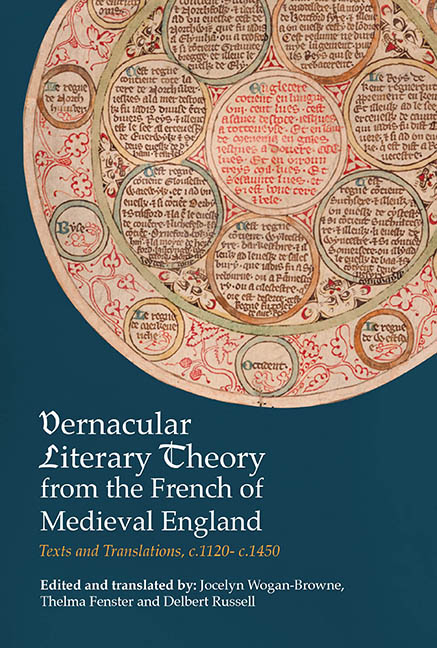 Vernacular Literary Theory from the French of Medieval England
Vernacular Literary Theory from the French of Medieval England Book contents
- Frontmatter
- Dedication
- Contents
- List of Maps and Illustrations
- Preface
- Abbreviations
- Map
- General Introduction
- Establishment of Texts and Translations and Conventions Used
- Part I Faus franceis and dreit engleis: On Language
- Part II Si sa dame ne li aidast: Authorship and the Patron
- Part III Primes dirrum la dreyte fei: The Conduct of Reading, Hearing and Seeing
- Part IV Ki veult oïr: Forming Audiences and Creating Textual Communities
- Part V Si come en latyn trovay escrit: The Lineage of the Text
- Postlude. Honneurs publiées … en divers royaumes
- Part VI Essays and Resources
- Timeline
- Glossary
- Bibliography
- General Index
- Index of Manuscripts
Part III - Primes dirrum la dreyte fei: The Conduct of Reading, Hearing and Seeing
Published online by Cambridge University Press: 25 October 2017
- Frontmatter
- Dedication
- Contents
- List of Maps and Illustrations
- Preface
- Abbreviations
- Map
- General Introduction
- Establishment of Texts and Translations and Conventions Used
- Part I Faus franceis and dreit engleis: On Language
- Part II Si sa dame ne li aidast: Authorship and the Patron
- Part III Primes dirrum la dreyte fei: The Conduct of Reading, Hearing and Seeing
- Part IV Ki veult oïr: Forming Audiences and Creating Textual Communities
- Part V Si come en latyn trovay escrit: The Lineage of the Text
- Postlude. Honneurs publiées … en divers royaumes
- Part VI Essays and Resources
- Timeline
- Glossary
- Bibliography
- General Index
- Index of Manuscripts
Summary
Introduction
Part III is a long sub-division among our entries because it is concerned with the conduct both of texts and their audiences and hence also with the various modes of access envisaged by texts and adopted by users. Many French-language texts are vitally concerned with doctrine, exemplarity, memorability and value in reading, and hence with the performative efficacy, including the entertainment value of texts, and their ethical and devotional effects. Primes dirrum la dreyte fey (‘First we will rehearse the true faith’, 24.13): what ought to be in texts, how texts should be ordered, the politics of access – on the page, in the language, in the choice of text-, the relation of reader and text (visually, somatically, affectively, intellectually), the politics of style, questions of verse and prose, of orality, audition, visual literacies, and performance all contribute to a wide vocabulary of topoi for the realisation of text in various dimensions and in the reception and responses of audiences.
Texts often inscribe how they are to be narrated and responded to as endemic to their meaning and performance, and a further aspect of this performed ‘situatedness’ in audience-text relations is the existence of a vigorous lexis of reception. Alongside verbs for writing and composing, the envisaging of the audience who will read (lirrunt), hear read (orrunt) and see (verrunt) texts is recurrent. Audiences should hear volontiers and with delit, should profiter, aprendre, gain amendement, savor (spiritual nourishment), moralité, divinité and essample, confort, desport, doctrine, enluminement, ensensement (instruction), joie, manger (nourishment [fig.]) or solaz from texts, the right kind of which they should aimer and by which authors should not bore (ennuier) them: audiences may not have full leisir to parlire or oïr (read or hear) texts right through and texts, as well as being beals (beautiful, fine) and not peddling arveire (deception, illusion) or mençonge (lies), must often be abriggez and work briefment to avoid audience ennui, especially if they want to be loez (praised), preisee (valued) or to please (pleire) and to be cher tenuez (cherished).
- Type
- Chapter
- Information
- Vernacular Literary Theory from the French of Medieval EnglandTexts and Translations, c.1120- c.1450, pp. 151 - 248Publisher: Boydell & BrewerPrint publication year: 2016


